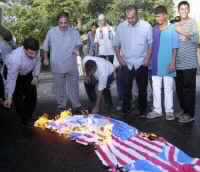WASHINGTON (Reuters) - Mohamed Atta, suspected of hijacking the first plane that struck the World Trade Center last week, had met earlier this year with an Iraqi intelligence official in Europe, U.S. sources said on Tuesday.
Atta, a 33-year-old Egyptian, had studied at an engineering school in Hamburg, Germany, and took flying lessons in Florida. He was on board the first plane that demolished the Twin Towers in New York on Sept. 11.
Recent intelligence information received by the United States showed Atta had met with a representative of Iraqi intelligence this year, sources told Reuters.
The sources said the meeting took place in Europe but did not divulge the exact location, nor who the Iraqi intelligence official was, other than it was not the head of the intelligence services.
It was unclear what Atta and the Iraqi official discussed at the meeting and whether there was any connection to the attacks on New York and the Pentagon near Washington.
``We don't know that it is (connected), there's no evidence that it was, it's something that needs to be looked into further,'' one U.S. government source said.
Some intelligence experts, including former CIA Director James Woolsey, have suggested the United States look more deeply into whether there was Iraqi involvement in the attack.
But one U.S. official said there was no clear evidence any country backed the plot and attack which left the World Trade Center in rubble and the Pentagon damaged, with nearly 6,000 people dead or missing, and prompted President Bush to declare a war on terrorism. (Read photo caption below)
``There's lots of little bits and threads and hints and nuggets out there, however is there some compelling evidence of state sponsorship? Not at this time. Are we looking at that? Sure among a thousand different things,'' said the official, who spoke on condition of anonymity.
The Iraqi intelligence structure is complex with various branches in which President Saddam Hussein's sons, relatives, and clan members are involved, said Anthony Cordesman, a senior fellow at The Center for Strategic and International Studies.
LOOSE NETWORK
Atta was part of a loose network of militants so it would not be unusual for him to have met with an Iraqi intelligence representative, said Cordesman, a Middle East expert who formerly worked at the U.S. State and Defense Departments.
``The fact that in this sort of loose coalition there is a constant exchange does not in any sense mean that there was common planning,'' Cordesman said.
``It doesn't rule it out, but one indicator and one meeting almost falls in the noise level of how these groups operate. It is not evidence of a conspiracy,'' he said.
Cordesman also cautioned that some in Washington were trying to emphasize potential Iraqi involvement to further their own agendas for lashing out at Saddam's government.
``The set of hidden agendas in Washington is such, so that it makes speculation particularly dangerous,'' he said. Some might try to use the Atta-Iraqi connection ``as a way of broadening what we're doing (in response to the attack), to include Saddam Hussein,'' Cordesman said.
Woolsey has said the high degree of coordination involved in the attacks suggested another country may have backed it.
``There is a reasonable chance and indeed there are ways to find out whether Iraqi intelligence was involved in the 1993 World Trade Center bombing,'' Woolsey said.
``And if they were involved in '93 that would certainly suggest that we ought to examine the possibility that they were involved Sept. 11,'' he told Reuters.
If somehow it were proved that Iraqi intelligence was involved in the attack, that would mean the government had backed it, Woolsey said. ``Iraqi intelligence is not a rogue element. If Iraqi intelligence was involved, the government of Iraq was involved,'' he said.
Vice President Dick Cheney was asked bluntly on NBC's ``Meet the Press'' on Sunday whether there was any evidence that Iraq was linked to the attacks. Cheney responded: ``No.''
PHOTO CAPTION:
Palestinians living in Iraq burn American, British and Israeli flags outside the United Nations development program office in Baghdad on Monday, Sept. 17. 2001 on the 19th anniversary of the massacre of the Palestinians in Sabra and Chatilla refugee camps in Lebanon in 1982. (AP Photo/Jassim Mohammed)
- Sep 17 3:04 PM ET
- Author:
Reuters - Section:
WORLD HEADLINES


 Home
Home Discover Islam
Discover Islam Quran Recitations
Quran Recitations Lectures
Lectures
 Fatwa
Fatwa Articles
Articles Fiqh
Fiqh E-Books
E-Books Boys & Girls
Boys & Girls  Articles
Articles










